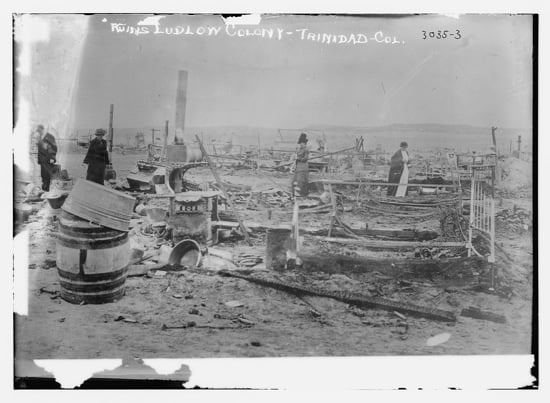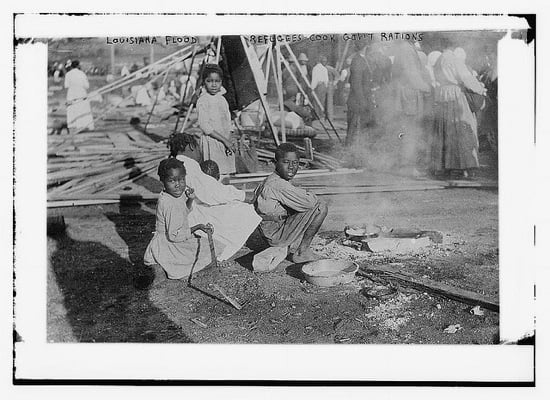The Scarlet Plague (11)
By:
March 29, 2012

HILOBROW is pleased to present the eleventh installment of our serialization of Jack London’s The Scarlet Plague. New installments will appear each Thursday for 12 weeks.
London’s post-apocalyptic novel is partly set in 2013; 2012 marks the centennial of its first serialization. In May, HiLoBooks will publish a beautiful new edition of The Scarlet Plague, checked against the 1915 first published edition (Macmillan), with an introduction by science fiction author (and HiLobrow cofounder) Matthew Battles. NOW AVAILABLE FOR PRE-ORDERING.
SUBSCRIBE to HILOBROW’s serialized fiction via RSS.
LAST WEEK: “He was very insulting. He said that in the old days he had been a servant, had been dirt under the feet of men like me and of women like Vesta, and that now he had the greatest lady in the land to be servant to him and cook his food and nurse his brats. ‘You had your day before the plague,’ he said; ‘but this is my day, and a damned good day it is. I wouldn’t trade back to the old times for anything.'”
ALL EXCERPTS: 1 | 2 | 3 | 4 | 5 | 6 | 7 | 8 | 9 | 10 | 11 | 12
CHAPTER SIX (excerpt 1 of 2)
“I lived three weeks of infinite torment there in the Chauffeur’s camp. And then, one day, tiring of me, or of what to him was my bad effect on Vesta, he told me that the year before, wandering through the Contra Costa Hills to the Straits of Carquinez, across the Straits he had seen a smoke. This meant that there were still other human beings, and that for three weeks he had kept this inestimably precious information from me. I departed at once, with my dogs and horses, and journeyed across the Contra Costa Hills to the Straits. I saw no smoke on the other side, but at Port Costa discovered a small steel barge on which I was able to embark my animals. Old canvas which I found served me for a sail, and a southerly breeze fanned me across the Straits and up to the ruins of Vallejo. Here, on the outskirts of the city, I found evidences of a recently occupied camp. Many clam-shells showed me why these humans had come to the shores of the Bay. This was the Santa Rosa Tribe, and I followed its track along the old railroad right of way across the salt marshes to Sonoma Valley. Here, at the old brickyard at Glen Ellen, I came upon the camp. There were eighteen souls all told. Two were old men, one of whom was Jones, a banker. The other was Harrison, a retired pawnbroker, who had taken for wife the matron of the State Hospital for the Insane at Napa. Of all the persons of the city of Napa, and of all the other towns and villages in that rich and populous valley, she had been the only-survivor. Next, there were the three young men —Cardiff and Hale, who had been farmers, and Wainwright, a common day-laborer. All three had found wives. To Hale, a crude, illiterate farmer, had fallen Isadore, the greatest prize, next to Vesta, of the women who came through the plague. She was one of the world’s most noted singers, and the plague had caught her at San Francisco. She has talked with me for hours at a time, telling me of her adventures, until, at last, rescued by Hale in the Mendocino Forest Reserve, there had remained nothing for her to do but become his wife. But Hale was a good fellow, in spite of his illiteracy. He had a keen sense of justice and right-dealing, and she was far happier with him than was Vesta with the Chauffeur.

“The wives of Cardiff and Wainwright were ordinary women, accustomed to toil with strong constitutions — just the type for the wild new life which they were compelled to live. In addition were two adult idiots from the feeble-minded home at El-dredge, and five or six young children and infants born after the formation of the Santa Rosa Tribe. Also, there was Bertha. She was a good woman, Hare-Lip, in spite of the sneers of your father. Her I took for wife. She was the mother of your father, Edwin, and of yours, Hoo-Hoo. And it was our daughter, Vera, who married your father, Hare-Lip — your father, Sandow, who was the oldest son of Vesta Van Warden and the Chauffeur.
“And so it was that I became the nineteenth member of the Santa Rosa Tribe. There were only two outsiders added after me. One was Mungerson, descended from the Magnates, who wandered alone in the wilds of Northern California for eight years before he came south and joined us. He it was who waited twelve years more before he married my daughter, Mary. The other was Johnson, the man who founded the Utah Tribe. That was where he came from, Utah, a country that lies very far away from here, across the great deserts, to the east. It was not until twenty-seven years after the plague that Johnson reached California. In all that Utah region he reported but three survivors, himself one, and all men. For many years these three men lived and hunted together, until, at last, desperate, fearing that with them the human race would perish utterly from the planet, they headed westward on the possibility of finding women survivors in California. Johnson alone came through the great desert, where his two companions died. He was forty-six years old when he joined us, and he married the fourth daughter of Isadore and Hale, and his eldest son married your aunt, Hare-Lip, who was the third daughter of Vesta and the Chauffeur. Johnson was a strong man, with a will of his own. And it was because of this that he seceded from the Santa Rosans and formed the Utah Tribe at San José. It is a small tribe — there are only nine in it; but, though he is dead, such was his influence and the strength of his breed, that it will grow into a strong tribe and play a leading part in the recivilization of the planet.

“There are only two other tribes that we know of — the Los Angelitos and the Carmelitos. The latter started from one man and woman. He was called Lopez, and he was descended from the ancient Mexicans and was very black. He was a cowherd in the ranges beyond Carmel, and his wife was a maidservant in the great Del Monte Hotel. It was seven years before we first got in touch with the Los Angelitos. They have a good country down there, but it is too warm. I estimate the present population of the world at between three hundred and fifty and four hundred — provided, of course, that there are no scattered little tribes elsewhere in the world. If there be such, we have not heard from them. Since Johnson crossed the desert from Utah, no word nor sign has come from the East or anywhere else. The great world which I knew in my boyhood and early manhood is gone. It has ceased to be. I am the last man who was alive in the days of the plague and who knows the wonders of that far-off time. We, who mastered the planet — its earth, and sea, and sky — and who were as very gods, now live in primitive savagery along the water courses of this California country.
“But we are increasing rapidly — your sister, Hare-Lip, already has four children. We are increasing rapidly and making ready for a new climb toward civilization. In time, pressure of population will compel us to spread out, and a hundred generations from now we may expect our descendants to start across the Sierras, oozing slowly along, generation by generation, over the great continent to the colonization of the East — a new Aryan drift around the world.
“But it will be slow, very slow; we have so far to climb. We fell so hopelessly far. If only one physicist or one chemist had survived! But it was not to be, and we have forgotten everything. The Chauffeur started working in iron. He made the forge which we use to this day. But he was a lazy man, and when he died he took with him all he knew of metals and machinery. What was I to know of such things? I was a classical scholar, not a chemist. The other men who survived were not educated. Only two things did the Chauffeur accomplish — the brewing of strong drink and the growing of tobacco. It was while he was drunk, once, that he killed Vesta. I firmly believe that he killed Vesta in a fit of drunken cruelty though he always maintained that she fell into the lake and was drowned.
NEXT WEEK: “Strange it is to hear the vestiges and remnants of the complicated Aryan speech falling from the lips of a filthy little skin-clad savage. All the world is topsy-turvy. And it has been topsy-turvy ever since the plague.”
RADIUM AGE SCIENCE FICTION: “Radium Age” is HILOBROW’s name for the 1904–33 era, which saw the discovery of radioactivity, the revelation that matter itself is constantly in movement — a fitting metaphor for the first decades of the 20th century, during which old scientific, religious, political, and social certainties were shattered. This era also saw the publication of genre-shattering writing by Edgar Rice Burroughs, Sax Rohmer, E.E. “Doc” Smith, Jack London, Arthur Conan Doyle, Aldous Huxley, Olaf Stapledon, Karel Čapek, H.P. Lovecraft, Charlotte Perkins Gilman, Yevgeny Zamyatin, Philip Gordon Wylie, and other pioneers of post-Verne/Wells, pre-Golden Age “science fiction.” More info here.
HILOBOOKS: The mission of HiLoBooks is to serialize novels on HiLobrow; and also, as of 2012, operating as an imprint of Richard Nash’s Cursor, to reissue Radium Age science fiction in beautiful new print editions. So far, we have published Jack London’s The Scarlet Plague, Rudyard Kipling’s With the Night Mail (and “As Easy as A.B.C.”), Arthur Conan Doyle’s The Poison Belt, H. Rider Haggard’s When the World Shook, Edward Shanks’s The People of the Ruins, William Hope Hodgson’s The Night Land, and J.D. Beresford’s Goslings. Forthcoming: E.V. Odle’s The Clockwork Man, Cicely Hamilton’s Theodore Savage, and Muriel Jaeger’s The Man with Six Senses. For more information, visit the HiLoBooks homepage.
READ: You are reading Jack London’s The Scarlet Plague. Also read our serialization of: Rudyard Kipling’s With the Night Mail | H. Rider Haggard’s When The World Shook
ORIGINAL FICTION: HILOBROW has serialized three novels: James Parker’s The Ballad of Cocky The Fox (“a proof-of-concept that serialization can work on the Internet” — The Atlantic) and Karinne Keithley Syers’s Linda Linda Linda. We also publish original stories and comics.
